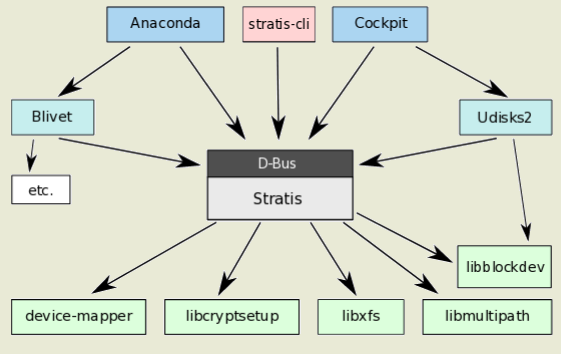Published Release of the project Stratis 3.0 Developed by Red Hat and the Fedora community to unify and simplify the means of setting up and controlling the pool from one or more local drives. Stratis provides opportunities such as dynamic selection of locations in storage, snapshots, integrity and creating a layer for caching. Stratis support is integrated into Fedora and Rhel distributions starting from Fedora 28 and Rhel 8.2 issues. Project code spreads under the MPL 2.0 license.
The system is largely repeated by its capabilities extended management tools for ZFS and BTRFS sections, But implemented in the form of a layer (demon Stratisd ) running on top of the Linux kernel Device Mapper (DM-Thin, DM modules are used -Cache, Dm-Thinpool, Dm-Raid and Dm-Integrity) and XFS File System. Unlike ZFS and BTRFS, Stratis components work only in the user space and do not require the loading of specific kernel modules. The project is initially presented as does not require to administer the qualifications of an expert on storage systems.
The control is provided by the D-BUS API and Cli utility .
Stratis is tested with block devices based on LUKS (encrypted sections), MDRAID, DM-MultiPath, ISCSI, LVM logic volumes, as well as various NGMD, SSD and NVME drives. In the presence of one disk, Stratis allows you to use logical partitions with support for snapshots to roll back the changes. When adding a few drives to the pool, it is possible to logically combine drives into a continuous area. Opportunities like
RAID, data compression, deduplication and the organization of fault tolerance are not yet supported, but scheduled for the future.
Significant change of version number is explained By changing the interface to control via D-BUS and termination Supports FetchProperties interfaces in favor of using properties and D-BUS-based methods. In the new release also added verification of UDEV rules using libblkid before making changes, the processing of events from DeviceMapper is redone, the internal representation has been changed Error handlers, recycled code to roll back the changes (ROLLBACK), is allowed to indicate a logical size when creating an FS. In the CLEVIS framework used to automatically encrypt and decrypt data in disk sections, hashi SHA-256 are involved instead of SHA-1. The ability to change the password phrase and overgenerate bindings to Clevis.
